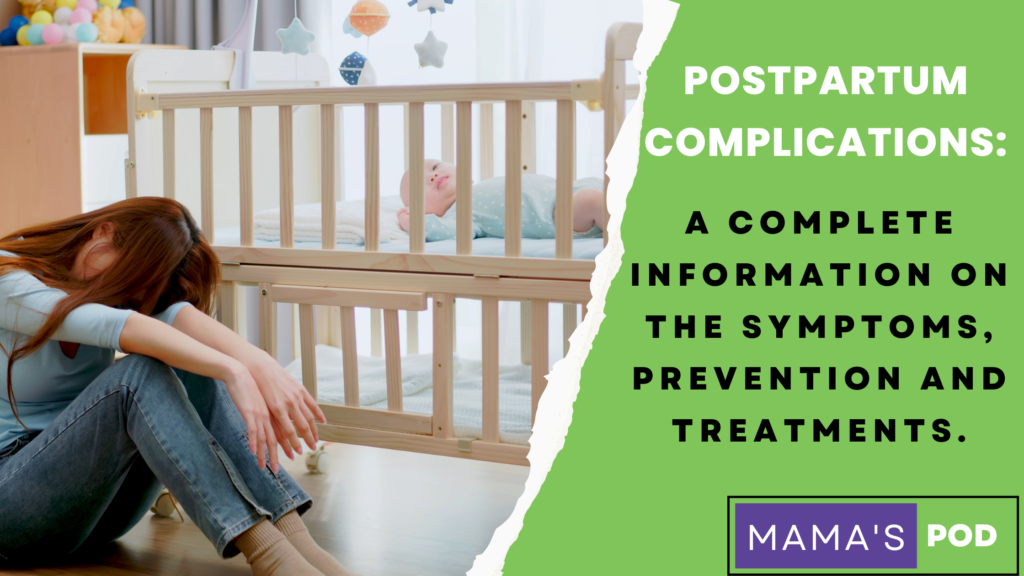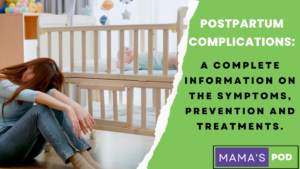While you may still be basking in the euphoria of welcoming a new-born, nothing ever prepares you for the changes and sometimes health challenges that may arise within the first six weeks after birth.
Postpartum complications are serious health complications that may arise within the first six weeks or months after birthing a child. At first, these symptoms may seem normal, however, the more you leave it to chance, the uglier it becomes.
Here is a well-researched article on Postpartum complications: Symptoms, Preventions and Treatments.
Post Partum Complications: An Overview About this Condition
Postpartum complications are maternal-related conditions arising within the first six weeks or even months after Childbirth. During this period, your body goes through some physical and emotional changes that can be absolutely normal. For this reason, you are always encouraged to get enough rest during the first-six weeks. Getting enough rest during the postpartum period helps to hasten the recovery process.
However, things start to get out of hand when you can’t really control how you feel or the sudden rush of changes occurring in your body. At this junction, you are advised to take a quick trip to your Obstetrician or Gynecologist to help nip the bud as early as possible.
In a report given by the Centres for Disease Control & Prevention, the number of reported pregnancy-related deaths in the United States steadily increased from 7.2 deaths per 100,000 live births in 1987 to 17.3 deaths per 100,000 live births in 2018.
Here are the major culprits of Postpartum Complications:
Breast Tenderness and Pain:
Experiencing a subtle pain in one or both breasts is no cause for alarm during the postpartum period. In fact, mothers are expected to experience some level of discomfort whenever their milk supply starts to flow which happens 3-5 days after delivery.
For new and even old-time mothers who intend to breastfeed, the first few days of breastfeeding may present to you some level of tenderness and discomfort in your nipples, but this should be solved after a few days of adapting to the latching process.
On the flip side, mothers who don’t breastfeed can settle in for some over-the-counter medication or cold compresses to help ease the pain.
However, you should race to the hospital when your nipple starts to leak blood accompanied by a very high temperature.
Haemorrhage/ Excessive Bleeding:
Losing a few drops of blood after delivery is ABSOLUTELY normal. After delivery (either through the Vagina or caesarean Section), many mothers are expected to bleed between 2-6 weeks, passing out chunks of red blood clots.
In the weeks that follow, blood flow should become considerably lesser with darker hues.
However, Postpartum Haemorrhage or excessive bleeding occurs when the Uterus fails to contract appropriately or when a tear occurs in the Vagina.
Some of the major culprits of postpartum haemorrhage are tied to having multiple babies or having a remnant of the placenta stuck in the uterus. In this case, emergency surgery is highly recommended.
Vagina Tears–
This Postpartum complication is relatable to mothers who deliver through the Vagina. Vagina tears occur when the baby moves through the Vagina canal, which oftentimes results in stitches.
While you may experience some level of pain in the sites of the incision, using a squirt bottle after visiting the washroom, or making use of a ring-shaped pillow while sitting would help you cope with the pain during the healing process.
Nonetheless, it is totally abnormal for you to experience a heightened level of pain in your lady parts while you heal. In such a scenario, it is advisable you pay a quick visit to your Doctor.
Infections-
You should note that during the postpartum period, while your body goes through a recovery process, you’re more vulnerable to infections than ever before.
Infections like Mastitis, Uterine and kidney infection, and even infection of the C-section/ vagina incisions are some of the common postpartum complications mothers do complain about.
While Mastitis may arise from a blocked milk duct, Uterine and Kidney infections are postpartum complications that may arise from the birthing process.
For mothers who went through Ceassarian procedures, an infection may arise from the incision site if adequate care is not taken.
Therefore, whenever you notice symptoms such as incredibly high white blood cell count, Heart Palpitations accompanied by high fever, inflamed uterus, and a stinky discharge, you should not hesitate to visit the hospital.
Your doctor would prescribe antibiotics that could help curb the situation at an early level.
Although the same treatment is not guaranteed if the infection is in its advanced stage.
Incontinence or Constipation–
Experiencing some level of faecal or Urinal incontinence calls for no alarm. After all the muscles involved in keeping urine at bay are still the same ones used in birthing your baby. As a result, these muscles may be temporarily weakened to perform their jobs appropriately.
You are more likely to experience this Incontinence whenever you sneeze, cough or laugh so hard. However, this shouldn’t go on for so long because as your body recovers over time, the incontinence should inevitably stop.
On the other hand, while some mothers do complain of incontinence, others may complain about constipation, otherwise known as hindered toilet movements.
You may experience some faecal discomfort a few days before labour and sometimes post-delivery.
Changes in diet, drinking enough fluids and focusing on light activities like walking, stretches and squats can help alleviate conditions. Meanwhile, you can manage this situation by putting on wearing menstrual pads or cotton-soft post partum diapers.
Most Importantly, you must ensure you seek your doctor’s approval before making use of any laxatives or herbal medications.
Postpartum Depression-
Nothing could have ever prepared you for the emotional Instability and the feeling of anxiety, you would experience post-delivery. Funny enough, it is termed under one word namely; Baby Blues.
Experiencing a few weeks of baby blues is quite normal. But when you find symptoms persisting for longer, you may be experiencing a case of postpartum depression.
According to a Journal by the National Institute for Health, around one in seven women can develop Postpartum depression. PPD is no cause for shame, neither is it a cause for stigmatization.
You should consult a specialist immediately you suspect you might be having a bout of Postpartum depression.
Remember, while you care for your baby, it is totally NECESSARY to care for yourself too.
Discomfort During Sexual Relations
Sexual relations should only continue whenever you feel your body is ready for such exercise. Most Doctors would advise waiting between 4-6 weeks before resuming any sexual activities.
At first the encounter, you may notice some slight discomfort and a dry vagina but this should be no life-threatening scenario. A few more attempts should do the trick.
However, you should seek help if you are faced with intense pain in the vagina during intercourse. This might be an internal or psychological cause for concern.
Other Issues Worth Making Mention Of:
While the above-mentioned conditions are the most prominent ones many mothers experience, you should also be made aware of these as well-
- Sepsis: A Postpartum complication in which the infection you have triggers a chain response throughout the body. Infections in the body affect the kidney, Uterus, lungs and other organs in the body. If left untreated for a long time, it may result in untimely death.
- Cardiovascular events: These include any heart or blood-related conditions that may arise during the post-partum period. They may range from High-blood pressure, Heart attack, dizziness or numbness.
- Postpartum preeclampsia: This is a rare but life-threatening condition related to high blood pressure after putting to bed. It’s most common within 48 hours of delivery but can occur up to six weeks after delivery. Postpartum preeclampsia if left untreated can lead to strokes, seizures and other complications.
- Fulminant Colitis: Fulminant colitis occurs when mothers visit the toilet more than 10 times per day, with continuous bleeding, abdominal pain, distention, and high fever.
- Dyspnea/ Chest pain: Shortness of breath — known medically as dyspnea — is often described as an intense tightening in the chest, air hunger, difficulty breathing, breathlessness or a feeling of suffocation. All these could be culminating symptoms of a high-risk condition that may need immediate medical attention.
Those Highly Susceptible to developing Postpartum complications.
Although the risks associated with postpartum conditions are on the low side. However, Mothers with a history of conditions such as cardiac disease, obesity or high blood pressure are at greater risk of dying or nearly dying from pregnancy-related complications. It is best to consult with your healthcare provider as frequently as possible.
Symptoms that May Indicate Postpartum Complications.
- Excessive bleeding in which you make use of more than a single menstrual pad per hour.
- A sudden feeling of tightness in your chest region.
- Suicidal thoughts towards yourself of your baby.
- Foul-smelling discharge from the vagina
- Pus oozing out from incision site.
- Swollen legs that may be painful to touch
- Constant headaches accompanied by dizziness
- An increased temperature of over 38 degrees celsius
Postpartum Complications: Prevention tips you should know about.
Any mother-whether new or old timers- can run at risk of developing postpartum complications. Nevertheless, you can reduce the risk by following each of the steps below.
- Prioritize your postpartum health: After Childbirth, your body needs all of the rest it can get to aid recovery. While you attend to the whims of your newborn, you shouldn’t neglect your health too. Ensure you are not missing a dose of the prescribed vitamins and medications needed to hasten your full recovery.
- Be dedicated to going for routine check-ups on the appointed date: It is advisable you make your three-week and 12-week postpartum check-ups a MUST. Likewise, ensure to schedule and attend any other appointments your doctor recommends.
- Always ensure you keep a track of your medical history. In fact, this may turn out to help when you need to discuss a certain issue with your doctor.
- Never hesitate to reach out to your healthcare provider whenever you need some clarification.
- Engage in light exercises: Although you may be required to get some bed rest within the first few days or weeks after delivery. Engaging in light activities like walking, squats, or stretches can also help speed up recovery likewise boost immunity.
Final Conclusion.
One in every seven mothers is predicted to develop postpartum complications. Although the condition in itself is not life-threatening, You should still reach out to your healthcare provider whenever you notice something unusual going on within you. Remember, you can only raise a healthy baby only when you are also full of health too.
Read this next: 6 Best Postpartum Pajamas.






